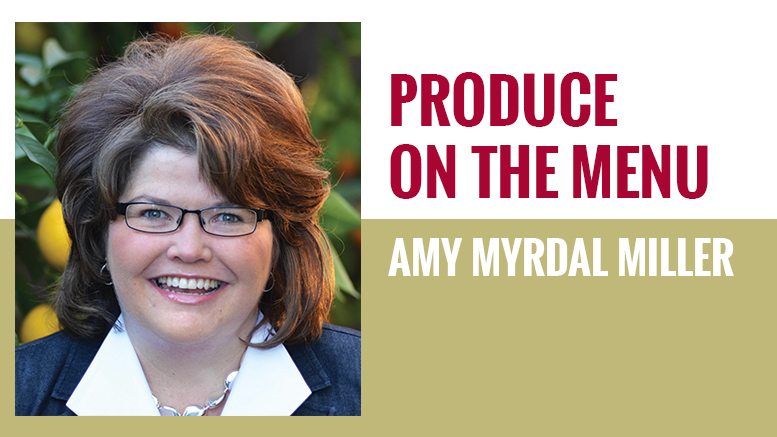What Do Diners Want from Restaurants?
May 25, 2021 | 4 min to read
As vaccination rates rise and restaurants welcome diners back, consumers increasingly crave not only comfort foods but also nutritious options that boost immunity. A Datassential poll reveals that 78% believe diet impacts illness defense, with vitamin C, D, and antioxidants leading the sought-after nutrients. Many respondents express a desire for immunity-enhancing foods like citrus and leafy greens on menus. Innovative restaurants, such as Dunkin’, are adapting their offerings to meet these new demands, blending comfort food with health-conscious choices.

Originally printed in the April 2021 issue of Produce Business.
More and more Americans are getting vaccinated every day. Restaurants across the country are being allowed to increase indoor dining capacity. And diners are eager to get to restaurants for a sit-down experience with the service we have so desperately missed the past year. Research from Datassential shows us that while many people report craving familiar comfort foods, increasing numbers of Americans are interested in foods and beverages that boost immunity.
Nearly eight out of ten people (78%) who responded to a Datassential online poll said they believe diet has a major impact on how well the body fights and protects against illness. More than seven out of ten (71%) believe certain vitamins and minerals can help boost immunity against Coronavirus and other viruses. When asked which nutrients do you believe could help boost your immunity and/or strengthen your recovery in case you get sick, the top responses were vitamin C, vitamin D, and antioxidants.
Unfortunately, belief and proof don’t always align. For example, vitamin C may reduce the severity and length of the common cold, but taking large doses will not protect you from the cold virus. The story is a bit more interesting for vitamin D. Research conducted during the earlier months of the pandemic show that people diagnosed with COVID with low vitamin D levels were more likely to be hospitalized compared to people who tested positive for COVID but had higher vitamin D levels. While this simply shows an association, more research is being done to see if vitamin D may play a powerful role in promoting immunity.
The key is finding the right fit for an operation’s brand personality and menu or finding a restaurant that is shifting its brand to meet the needs of today’s consumer.
Seven out of ten people in the Datassential survey believe certain foods and ingredients can help boost immunity against Coronavirus and other viruses. When asked what foods and ingredients they believed are most powerful at boosting immunity, four of the top five responses were produce items—citrus fruits, dark leafy greens, superfruits, and broccoli. Tea rounded out the top five responses. More than half of respondents (51%) said they wished immunity-boosting foods/ingredients were an option at all the places they go out to eat. And nearly six out of ten people (58%) believe a healthy diet will reduce their risk of getting Coronavirus.
Menu R&D professionals are taking note of these findings and seeking ways to add these ingredients to their menus, where appropriate. If you are working with restaurant operators and they have not yet seen these insights from Datassential, share them. Citrus fruits and superfruits are both perfect for fresh juice and cocktail programs while dark leafy greens and broccoli have wide application across day parts and menu categories.
The key is finding the right fit for an operation’s brand personality and menu or finding a restaurant that is shifting its brand to meet the needs of today’s consumer. Take Dunkin’ for example. Traditionally a coffee and donut shop, today the brand is adapting to changing consumer needs and expectations. In late February, the chain added to menus nationwide Dunkin’ Avocado Toast, an avocado spread made with avocado, sea salt, black pepper and lemon juice on sourdough toast topped with everything bagel seasoning. According to Jill Nelson, vice president, marketing & culinary at Dunkin’, “We’ve taken a popular brunch staple and made it accessible for anyone looking for something easy and delicious to eat on-the-go. With simple ingredients at an affordable price, Dunkin’s Avocado Toast is the latest feel-good addition to our evolving menu.”
Meanwhile, Sonic has found a way to combine the two trends of comfort and immunity by doing limited time offers (LTOs) of broccoli cheddar tots in select markets. Is it possible to find other ways to combine comfort and immunity? Absolutely! I expect to see more restaurants adding more produce to comfort food staples such as pizza, burgers and pasta dishes to entice the diner seeking greater immunity to choose those items. I also expect to see more fruit and vegetable juices used in cocktail programs as restaurants seek to drive up check averages and boost revenues from more profitable beverages.
Amy Myrdal Miller, MS, RDN, FAND is a farmer’s daughter from North Dakota, award-winning dietitian, culinary nutrition expert, and founder and president of Farmer’s Daughter Consulting, Inc. She is consultant for the Produce for Better Health Foundation, a member of the Texas A&M AgriLife External Advisory Board and a member of the Bayer Vegetable Seeds Horticultural Advisory Council. You can learn more about her business at www.farmersdaughterconsulting.com, and you can follow her insights on food and flavor on social media @AmyMyrdalMiller
6 of 17 article in Produce Business May 2021

